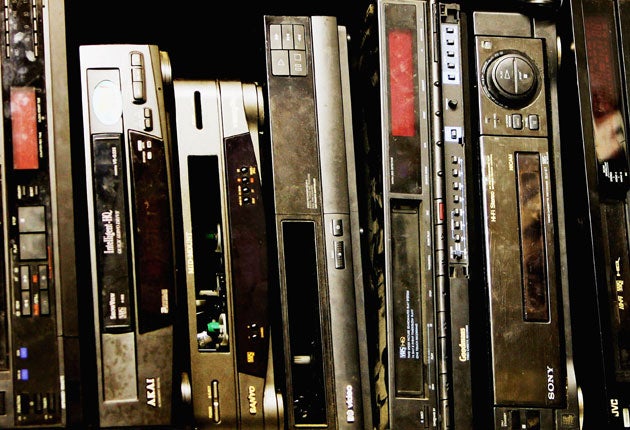Unwanted gadgets that could spark a charity cash drive
Hoarded appliances to be recycled for good causes

Your support helps us to tell the story
From reproductive rights to climate change to Big Tech, The Independent is on the ground when the story is developing. Whether it's investigating the financials of Elon Musk's pro-Trump PAC or producing our latest documentary, 'The A Word', which shines a light on the American women fighting for reproductive rights, we know how important it is to parse out the facts from the messaging.
At such a critical moment in US history, we need reporters on the ground. Your donation allows us to keep sending journalists to speak to both sides of the story.
The Independent is trusted by Americans across the entire political spectrum. And unlike many other quality news outlets, we choose not to lock Americans out of our reporting and analysis with paywalls. We believe quality journalism should be available to everyone, paid for by those who can afford it.
Your support makes all the difference.They may be about as useful as a mobile phone that has run out of power, but millions of us are holding on to old CD players, kettles, radios and toasters that could be put to better use, according to a new report.
Small electrical goods are the final frontier in the struggle to get Britons recycling more now that we regularly send newspapers, bottles, cans, and even old clothes to be reused, the government-funded not-for-profit company Wrap said this weekend.
Just one in five of the old appliances that lurk in desk drawers, bedside cabinets and in boxes under beds are being recycled, with nearly half the population hanging on to old toasters, telephones, CD players, kettles or radios in the hope that they might come in handy one day, according to a new survey published on the eve of Recycling Week.
Now charity shops are urging people to cut the emotional ties that stop millions of us from getting rid of old electrical goods, and instead donate them to be sold in one of their specialist electrical outlets. Small electrical items make up one of the fastest-growing waste streams in the UK, with more than 173 million new gadgets or appliances bought every year, according to Wrap.
Mike Lucas, retail director at the British Heart Foundation, last night appealed for people to donate their unwanted kettles and toasters to one of its 96 outlets. The charity is aiming to double the number of its furniture and electrical stores over the next two years, opening a further 40 sites over the next 12 months.
"There's a very high demand for small electrical products, and it's always a challenge to ensure that we have sufficient quantities of the right stock," Mr Lucas said. "People seem to hang on to them or dispose of them in a different way [rather than donate them]."
The survey for Recycle Now, Wrap's recycling campaign arm, found that one in three people keep their old gadgets because they are not sure what to do with them. Although retailers will collect large items such as washing machines and fridges for recycling, they do not do the same for small gadgets. Just over a third of respondents said they would feel better if they could donate or recycle unused small electrical goods.
A recent Which? report found that more people felt it was easier to throw away items such as toasters and kettles than recycle them. The latest figures from the Environment Agency show that just 14.5 per cent of the 480,000 tonnes of small electrical goods sold in the UK in the year to the end of June 2009 were collected for recycling.
Caroline Spelman, the Secretary of State for the Environment, said: "We've all got electrical items such as old CD players around our homes that are often not used or are replaced when the latest gadget comes along. These can be donated to charities or groups that can use them, or, if broken, can be recycled so they can be made into products of the future."
The British Heart Foundation made around £9m from sales of old electrical goods and furniture last year, nearly half of all the net profit it made from its retail outlets. As well as the British Heart Foundation, Cancer Research UK and Oxfam also have branches that accept small electrical items.
Join our commenting forum
Join thought-provoking conversations, follow other Independent readers and see their replies
Comments